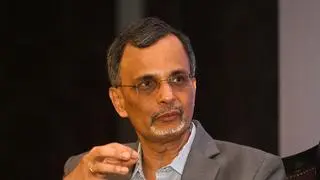After finding its feet in index derivatives, the country’s oldest bourse BSE is gearing up to dip its toes in stock derivatives. “Stock options and futures are very much on our radar,” the bourse’s Managing Director and CEO Sundararaman Ramamurthy told businessline. “But we want to stabilise our Sensex and Bankex derivatives offerings first before we embark on working on these segments.”
The exchange has not officially set a timeline or spelt out a gameplan for stock derivatives, where it has little to no turnover currently. Its immediate goal is to ramp up institutional participation in index derivatives instead. “Currently, we have 60 foreign portfolio investors trading Sensex derivatives; many more can trade on this segment. We are also revamping our colocation facilities, which will help boost volumes in both the cash and derivatives segments,” Ramamurthy said.
While the exchange insists that any product launch or revamp will be dictated by market needs and member requirements, the buzz on the Street is that there has been a nudge from the market regulator to look at the segment. An email sent to SEBI did not get a response.
BSE relaunched its weekly Sensex options product last year with a Friday expiry. Bankex expiry was shifted to Monday. Within months, BSE has wrested a 13 per cent market share in notional turnover in index derivatives. This is expected to inch up to 18-20 per cent in the coming months, according to analysts.
A lot harder
Reviving the moribund stock derivatives segment may be a lot harder, given higher volatility and lower depth. “The segment typically has large holders of stocks who influence prices either way. Only evolved traders dabble in stock derivatives — either those who are well-informed or long-term holders with a definite view,” said Deepak Jasani, Head - Retail Research, HDFC Securities.
Rival NSE currently offers over 180 stocks in index derivatives but BSE may offer a much lower number to begin with, said market watchers. It remains to be seen if BSE will offer any incentives to members for trading in stock derivatives considering that the exchange has stopped doing so in the index derivatives segment. “It will not be easy to make inroads in the stock F&O segment, unless there’s enough differentiation. This could be in the form of weekly or fortnightly expiry contracts or options on options, a second-order derivatives product sold in the US,” said Rahul Sharma, Director & Head - Technical & Derivatives Research, JM Financial Services.
Average daily turnover of stock futures for December at NSE stood at ₹1.26 lakh crore while that for stock options at ₹9,016 crore. “Sensex and Bankex derivatives trading has attained critical mass and become commercially viable. Higher foreign participation will bring in bulk buyers and sellers. The regulator, too, has hinted it is in favour of having two strong exchanges, and not lopsided competition. All this bodes well for BSE,” said Alok Churiwala, a stock broker.
That said, he reckons that kickstarting the stock derivatives segment may well take a year or more. “More competition will help in shoring up market volumes, bring in wider participation and provide arbitrage opportunities for traders,” added Sharma.
BSE shares have surged over 400 per cent in the past year.








Comments
Comments have to be in English, and in full sentences. They cannot be abusive or personal. Please abide by our community guidelines for posting your comments.
We have migrated to a new commenting platform. If you are already a registered user of TheHindu Businessline and logged in, you may continue to engage with our articles. If you do not have an account please register and login to post comments. Users can access their older comments by logging into their accounts on Vuukle.